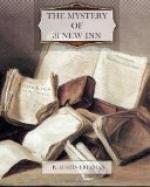Chapter VI
Jeffrey Blackmore, Deceased
Having made the above proposition, Thorndyke placed a fresh slip of paper on the blotting pad on his knee and looked inquiringly at Mr. Marchmont; who, in his turn, sighed and looked at the bundle of documents on the table.
“What do you want to know?” he asked a little wearily.
“Everything,” replied Thorndyke. “You have hinted at circumstances that would account for a change in Jeffrey’s habits and that would explain an alteration in the character of his signature. Let us have those circumstances. And, if I might venture on a suggestion, it would be that we take the events in the order in which they occurred or in which they became known.”
“That’s the worst of you, Thorndyke,” Marchmont grumbled. “When a case has been squeezed out to the last drop, in a legal sense, you want to begin all over again with the family history of every one concerned and a list of his effects and household furniture. But I suppose you will have to be humoured; and I imagine that the best way in which to give you the information you want will be to recite the circumstances surrounding the death of Jeffrey Blackmore. Will that suit you?”
“Perfectly,” replied Thorndyke; and thereupon Marchmont began:
“The death of Jeffrey Blackmore was discovered at about eleven o’clock in the morning of the fifteenth of March. It seems that a builder’s man was ascending a ladder to examine a gutter on number 31, New Inn, when, on passing a second-floor window that was open at the top, he looked in and perceived a gentleman lying on a bed. The gentleman was fully clothed and had apparently lain down on the bed to rest; at least so the builder thought at the time, for he was merely passing the window on his way up, and, very properly, did not make a minute examination. But when, some ten minutes later, he came down and saw that the gentleman was still in the same position, he looked at him more attentively; and this is what he noticed—but perhaps we had better have it in his own words as he told the story at the inquest.
“’When I came to look at the gentleman a bit more closely, it struck me that he looked rather queer. His face looked very white, or rather pale yellow, like parchment, and his mouth was open. He did not seem to be breathing. On the bed by his side was a brass object of some kind—I could not make out what it was—and he seemed to be holding some small metal object in his hand. I thought it rather a queer affair, so, when I came down I went across to the lodge and told the porter about it. The porter came out across the square with me and I showed him the window. Then he told me to go up the stairs to Mr. Blackmore’s chambers on the second pair and knock and keep on knocking until I got an answer. I went up and knocked and kept on knocking as loud as I could, but, though I fetched everybody out of all the other chambers in the house, I couldn’t get any answer from Mr. Blackmore. So I went downstairs again and then Mr. Walker, the porter, sent me for a policeman.




